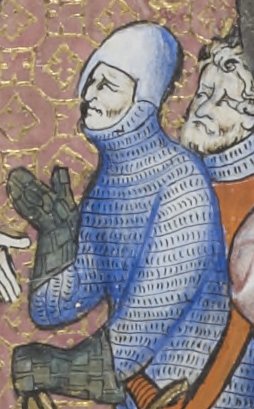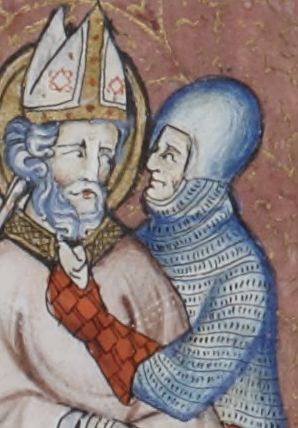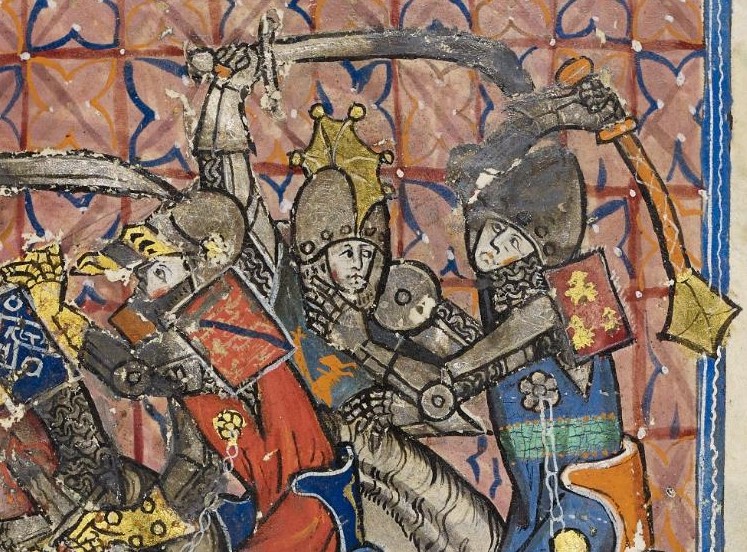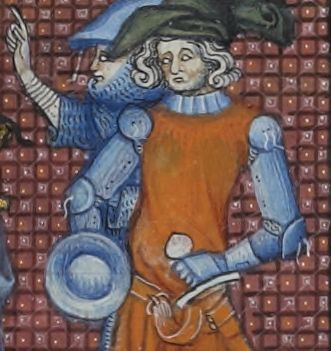ok, i have a few questions about hard gauntlets regarding their design and evolution during the late 13th century and the very early 14th century
the first question is in regards to the armour at the time of bannockburn especially regarding depictions in the digital reconstructions by tobias capwell for the big anniversery exhibition at the scottish heritage museam
some of those reconstructions show characters wearing, not just early arm harness defenses but also some forms of plate gauntlet http://learning.battleofbannockburn.com/media/1025/characters.png as shown here and also talked about in medieval warfare magazine, the issue is that most of the pictures are positioned in such a way that the designs of the gauntlets are not terribly clear so i would like to ask if anyone could show me more detailed pictures of that type, and also how early on that style was used
the second one is regarding this depiction here https://www.pinterest.com/pin/314618723939414974/ of a knight circa 1290 drawn as part of the osprey compilation 'knight, noble warrior of england in the 'english knight 1200-1300' section
more specifically is the mention of the use of whalebone gauntlets in the latter decades of the 13th century, i'd like to ask how far back these are used, and also whether perhaps these armoured mittens were worn on the bare hand or over the maille mufflers that made up the hauberk of most 13th century knights?
and on the topic of maille mufflers, is there any indication of said maille muffler mittens having a padded lining of sorts (since maille against bare skin would still hurt tremendously when struck on the hands)
In general, we start to see changes to hand protection beyond the attached mail mitten somewhere c.1300. This begins with separate mail mittens with large cuffs, some textile defenses which might have reinforcements of baleen or plate, and scale gauntlets. Early 'Wisby-style' gauntlets are easy to spot in art by the 1330s, but finding depictions quite so early as Bannockburn in 1314 is more difficult.
Documentary evidence:
1302: Inventory of Raoul de Nesle, Constable of France
http://forums.armourarchive.org/phpBB3/viewto...p;t=180226
Item ii paires de gans des armes de Neele xxxs.
Item, 2 pair of gauntlets with the arms of Nesle. 30 s.
Item ii paires de gantelés couvers de rouge cuir xxs
Item, 2 pairs of gauntlets covered in red leather. 20 s.
1311: Inventory of John fitz Marmaduke, Lord of Horden
http://forums.armourarchive.org/phpBB3/viewto...p;t=180611
j par de Waynpayns & ij brasers vj s. viij d.
1 pair of gauntlets & 2 bracers, 6s. 8d.
(Waynpayns gagné-pain is literally "bread winner", in the 1420 inventory of Charles VI we have:
Item, un gantelet appelé gagne pain.
Item, a gauntlet nicknamed "livelihood".)
vij paria Cirotecarum xiiij d.
7 pair of gauntlets (or gloves), 14d.
Cirotecae de balayn xij d.
Baleen gauntlets, 12d.
j par cirothecarum de ferro xij d.
1 pair of iron gauntlets, 12d.
j par cirothecarum xij d.
1 pair of gauntlets, 12d.
1316: Long Inventory of Arms of King Louis X
http://forums.armourarchive.org/phpBB3/viewto...p;t=180212
Item uns gantelez couvers de velveil vermeil.
Item, gauntlets covered in vermilion velvet.
1322: Inventory of arms, Robert of Béthune,(Robert III), Count of Flanders
http://forums.armourarchive.org/phpBB3/viewto...p;t=180207
Item , une paire de wans de haubergerie de France.
Item, a pair of gauntlets of mail-work from France.
Item , unes petites plates clauées d'argent , couvertes de samit de flours , et unes manches et uns wans de ce mesme.
Item, a small pair of plates with silver nails, covered in floral samite, and sleeves and gauntlets of the same.
Item , trois paires de wans de plates et une paire de wanteles de balainne , entretes(?) de blanc chendal.
Item, three pairs of gauntlets of plates, and one pair of gauntlets of whalebone, covered(?) of white cendal.
1322: Inventory of Roger de Mortimer, 1st Earl of March
http://forums.armourarchive.org/phpBB3/viewto...p;t=180231
j. pari cirothecarum de plate;
1 pair of gauntlets of plate
I'll post visual sources in separate posts.
Documentary evidence:
1302: Inventory of Raoul de Nesle, Constable of France
http://forums.armourarchive.org/phpBB3/viewto...p;t=180226
Item ii paires de gans des armes de Neele xxxs.
Item, 2 pair of gauntlets with the arms of Nesle. 30 s.
Item ii paires de gantelés couvers de rouge cuir xxs
Item, 2 pairs of gauntlets covered in red leather. 20 s.
1311: Inventory of John fitz Marmaduke, Lord of Horden
http://forums.armourarchive.org/phpBB3/viewto...p;t=180611
j par de Waynpayns & ij brasers vj s. viij d.
1 pair of gauntlets & 2 bracers, 6s. 8d.
(Waynpayns gagné-pain is literally "bread winner", in the 1420 inventory of Charles VI we have:
Item, un gantelet appelé gagne pain.
Item, a gauntlet nicknamed "livelihood".)
vij paria Cirotecarum xiiij d.
7 pair of gauntlets (or gloves), 14d.
Cirotecae de balayn xij d.
Baleen gauntlets, 12d.
j par cirothecarum de ferro xij d.
1 pair of iron gauntlets, 12d.
j par cirothecarum xij d.
1 pair of gauntlets, 12d.
1316: Long Inventory of Arms of King Louis X
http://forums.armourarchive.org/phpBB3/viewto...p;t=180212
Item uns gantelez couvers de velveil vermeil.
Item, gauntlets covered in vermilion velvet.
1322: Inventory of arms, Robert of Béthune,(Robert III), Count of Flanders
http://forums.armourarchive.org/phpBB3/viewto...p;t=180207
Item , une paire de wans de haubergerie de France.
Item, a pair of gauntlets of mail-work from France.
Item , unes petites plates clauées d'argent , couvertes de samit de flours , et unes manches et uns wans de ce mesme.
Item, a small pair of plates with silver nails, covered in floral samite, and sleeves and gauntlets of the same.
Item , trois paires de wans de plates et une paire de wanteles de balainne , entretes(?) de blanc chendal.
Item, three pairs of gauntlets of plates, and one pair of gauntlets of whalebone, covered(?) of white cendal.
1322: Inventory of Roger de Mortimer, 1st Earl of March
http://forums.armourarchive.org/phpBB3/viewto...p;t=180231
j. pari cirothecarum de plate;
1 pair of gauntlets of plate
I'll post visual sources in separate posts.
Last edited by Mart Shearer on Thu 31 Dec, 2015 12:54 pm; edited 1 time in total
Scale gauntlets.
http://manuscriptminiatures.com/4135/7292/
http://manuscriptminiatures.com/4268/8155/
http://manuscriptminiatures.com/4268/14131/
http://effigiesandbrasses.com/1240/5041/
 Attachment: 38.24 KB
Attachment: 38.24 KB

BNF Français 2091, fo.129r, 1317
 Attachment: 27.42 KB
Attachment: 27.42 KB

BNF Français 2092, fo.037v, 1317
http://manuscriptminiatures.com/4135/7292/
http://manuscriptminiatures.com/4268/8155/
http://manuscriptminiatures.com/4268/14131/
http://effigiesandbrasses.com/1240/5041/

BNF Français 2091, fo.129r, 1317

BNF Français 2092, fo.037v, 1317
There are a number of effigies showing the mail mittens doffed from the hands. Some seem to show the mail pattern on the interior, while others show a smooth surface, shich might indicate a cloth lining.
http://effigiesandbrasses.com/1723/4929/
http://effigiesandbrasses.com/1256/3153/
Separate mail gauntlets:
http://manuscriptminiatures.com/search/?tags=...untlets%22
It might make sense that separate mail gauntlets were were developed as more practical because they had some sort of integral glove with padding, where wearing the same under a huaberk's muffler reguired additional steps to remove.
It's difficult to determine if the apparent textile gauntlets are only padded, or if they have some baleen or iron plates inside, like the Munich pazerhosen or later jacks. I suspect most of the baleen gauntlets from inventories have a similar appearance.
http://corsair.morganlibrary.org/icaimages/7/m729.289v.jpg
Morgan M.729, fo.289v, 1280-1299
[ Linked Image ]
http://gallica.bnf.fr/ark:/12148/btv1b8451634m/f107.item
BNF Latin 10483, fo.53r, 1323-1326
[ Linked Image ]
http://www.bl.uk/manuscripts/Viewer.aspx?ref=arundel_ms_83_f125r
BL Arundel MS 83 (II), fo.125r, 1308-1340
http://manuscriptminiatures.com/media/manuscr.../894-3.jpg
http://effigiesandbrasses.com/1723/4929/
http://effigiesandbrasses.com/1256/3153/
Separate mail gauntlets:
http://manuscriptminiatures.com/search/?tags=...untlets%22
It might make sense that separate mail gauntlets were were developed as more practical because they had some sort of integral glove with padding, where wearing the same under a huaberk's muffler reguired additional steps to remove.
It's difficult to determine if the apparent textile gauntlets are only padded, or if they have some baleen or iron plates inside, like the Munich pazerhosen or later jacks. I suspect most of the baleen gauntlets from inventories have a similar appearance.
http://corsair.morganlibrary.org/icaimages/7/m729.289v.jpg
Morgan M.729, fo.289v, 1280-1299
[ Linked Image ]
http://gallica.bnf.fr/ark:/12148/btv1b8451634m/f107.item
BNF Latin 10483, fo.53r, 1323-1326
[ Linked Image ]
http://www.bl.uk/manuscripts/Viewer.aspx?ref=arundel_ms_83_f125r
BL Arundel MS 83 (II), fo.125r, 1308-1340
http://manuscriptminiatures.com/media/manuscr.../894-3.jpg
Here's an English example which seems to show a composite of textile, perhaps gamboissed, cuff and a riveted metacarpal plate.
http://manuscriptminiatures.com/5430/17808/
Some of the gauntlets recovered from Wisby had no visible cuff, so it could be that these were textile which decayed and left no trace,
http://mis.historiska.se/mis/sok/fid.asp?fid=531358&g=1
http://manuscriptminiatures.com/5430/17808/
Some of the gauntlets recovered from Wisby had no visible cuff, so it could be that these were textile which decayed and left no trace,
http://mis.historiska.se/mis/sok/fid.asp?fid=531358&g=1
A dozen years after Bannockburn, and the gauntlets seen in miniatures are well developed, though mail mittens remain the norm.
http://viewer.bodleian.ox.ac.uk/christchurch/...p;page=126
http://gallica.bnf.fr/ark:/12148/btv1b8451634m/f224.item
 Attachment: 237.25 KB
Attachment: 237.25 KB

Christ Church MS 92, fo.60r, 1326-1327
 Attachment: 27.79 KB
Attachment: 27.79 KB

BNF Latin 10483, fo.111v, 1323-1326
http://viewer.bodleian.ox.ac.uk/christchurch/...p;page=126
http://gallica.bnf.fr/ark:/12148/btv1b8451634m/f224.item

Christ Church MS 92, fo.60r, 1326-1327

BNF Latin 10483, fo.111v, 1323-1326
so then what do you make of the bannockburn depictions like the ones above, and http://learning.battleofbannockburn.com/media/20402/frame_1.jpg this depiction (figure is meant to be henry de bohun ) is it, innacurate, why do you think Dr capwell chose to add those gauntlets (it's a shame that i live too far to visit that exhibition personally)
how do you think those gauntlets correspond with the evidence, and are they considered a wisby style??
same for the osprey depiction of a C 1290 english knight suggesting baleen gauntlets as an option.
i ask about these two recreations for the sake of gaining reasonably accurate gauntlets for steel reenactment fighting for a late 13th century kit (where maille gauntlets, even with padding is largely just not enough for ones hands...
how do you think those gauntlets correspond with the evidence, and are they considered a wisby style??
same for the osprey depiction of a C 1290 english knight suggesting baleen gauntlets as an option.
i ask about these two recreations for the sake of gaining reasonably accurate gauntlets for steel reenactment fighting for a late 13th century kit (where maille gauntlets, even with padding is largely just not enough for ones hands...
Inaccurate is a bit harsh. I would say the depictions are conjectural, as our evidence from c.1315 is incomplete. We do have the records which slightly pre-date, or are roughly contemporary with Bannockburn which mention gauntlets of iron, but interpreting the contemporary visual evidence isn't conclusive, The multi-plate covering of the hand on the Bohun rendering is clearly earlier than the 1361 Wisby examples, as is the lack of knuckle plates, so it's a good conjecture of a "proto-Wisby style". It seems from the documents that many of the earlier plate gauntlets are covered in cloth or leather, which would hide details of their construction. Toby might have been relying on a source unknown to me, as well.
The scale gauntlets used in the Osprey text are largely based on the 1317 Vie de St. Denis manuscripts which I linked from the BNF, The gray and orange scales might represent iron and latten (brass), though it's possible baleen (white, dark brown, gray, black) could have been used in such a manner. Likewise, baleen strips or plaques could have been sewn between layers of fabric, or laced in like later "jacks of plate". Baleen found it's way into a number of armors, including neck defenses, espaliers over the shoulders, aketoner sleeves, and gauntlets, as well as being used for tournament swords at Windsor.
15 years can make quite a bit of difference in the appearance of armor. Often the manuscripts are not so accurately dated, with the holding institutions having to make a best guess of something like "first quarter of the 14th century" or "c. 1300". And how close is circa? +/- 5 years, 10 years, 20 years...? The 1302 Nesle inventory having covered gauntlets makes it reasonable to me that some sort of plate gauntlets were in use at least a decade earlier, as he was in his 50s when killed at the Battle of Courtrai. Those were likely made of small plates riveted to a foundation, but we simply don't have an intact example which can be dated that early that we can copy. All you can do is take the written evidence, look at contemporary sources, consider the safety requirements of the game, and make a good guess as to appearance.
The scale gauntlets used in the Osprey text are largely based on the 1317 Vie de St. Denis manuscripts which I linked from the BNF, The gray and orange scales might represent iron and latten (brass), though it's possible baleen (white, dark brown, gray, black) could have been used in such a manner. Likewise, baleen strips or plaques could have been sewn between layers of fabric, or laced in like later "jacks of plate". Baleen found it's way into a number of armors, including neck defenses, espaliers over the shoulders, aketoner sleeves, and gauntlets, as well as being used for tournament swords at Windsor.
15 years can make quite a bit of difference in the appearance of armor. Often the manuscripts are not so accurately dated, with the holding institutions having to make a best guess of something like "first quarter of the 14th century" or "c. 1300". And how close is circa? +/- 5 years, 10 years, 20 years...? The 1302 Nesle inventory having covered gauntlets makes it reasonable to me that some sort of plate gauntlets were in use at least a decade earlier, as he was in his 50s when killed at the Battle of Courtrai. Those were likely made of small plates riveted to a foundation, but we simply don't have an intact example which can be dated that early that we can copy. All you can do is take the written evidence, look at contemporary sources, consider the safety requirements of the game, and make a good guess as to appearance.
Page 1 of 1
You cannot post new topics in this forumYou cannot reply to topics in this forum
You cannot edit your posts in this forum
You cannot delete your posts in this forum
You cannot vote in polls in this forum
You cannot attach files in this forum
You can download files in this forum
All contents © Copyright 2003-2006 myArmoury.com — All rights reserved
Discussion forums powered by phpBB © The phpBB Group
Switch to the Full-featured Version of the forum
Discussion forums powered by phpBB © The phpBB Group
Switch to the Full-featured Version of the forum